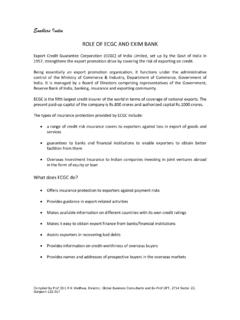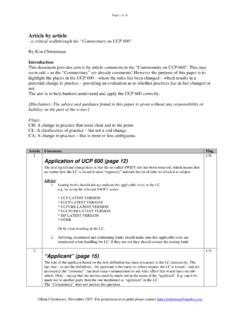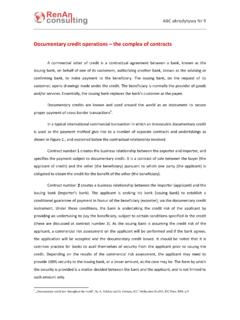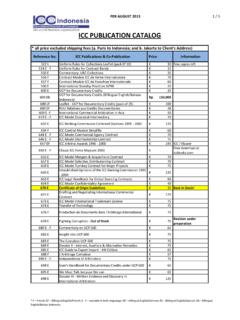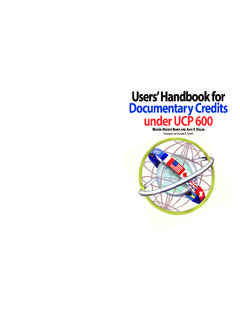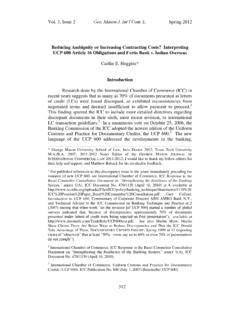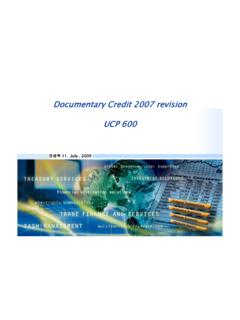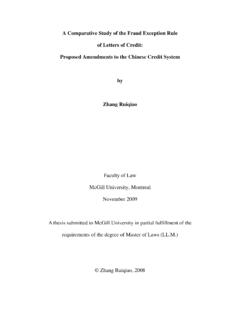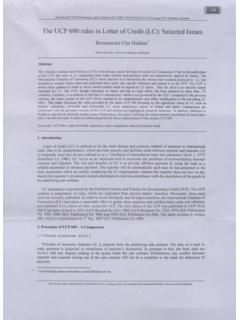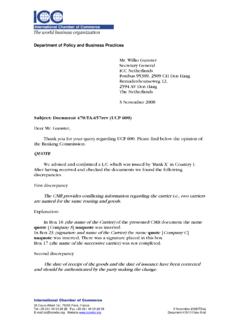Transcription of UCP 600 - Enablers India
1 Enablers India 2012 1 ucp 600 Why Documentary Credits Exchange of goods and services across national boundaries brings greater problems to both buyer and seller than does domestic business. Diversity of customs, standards, currencies, local regulations, languages and legal systems The Documentary Letter of Credit is widely used to reduce the financial risks of trade. Importer wants to ensure performance while exporter wants to secure payment. Few of the rules are subject to any national or international law. Provisions of International Chamber of Commerce & Industry (ICC) important, but not foolproof.
2 Generally adopted set of rules for credits known as the Uniform Customs and Practice for Letters of Credit (UCP) issued by ICC, publication , 2007 (earlier version no. 500, 1993). Introduction This revision of the Uniform Customs and Practice for Documentary Credits (commonly called "UCP") is the sixth revision of the rules since they were first promulgated in 1933. The objective of UCP, since attained, was to create a set of contractual rules that would establish uniformity in that practice, so that practitioners would not have to cope with a plethora of often conflicting national regulations.
3 The universal acceptance of the UCP by practitioners in countries with widely divergent economic and judicial systems is a testament to the rules' success. It is important to recall that the UCP represent the work of a private international organization, not a governmental body. Steps in L/C Transaction See slides on next two pages Important Articles Article 1 Application of UCP The Uniform Customs and Practice for Documentary Credits, 2007 Revision, ICC Publication no. 600 ("UCP") are rules that apply to any documentary credit ("credit") (including, to the extent to which they may be applicable, any standby letter of credit) when the text of the credit expressly indicates that it is subject to these rules.
4 They are binding on all parties thereto unless expressly modified or excluded by the credit. Article 2: Definitions Advising bank means the bank that advises the credit at the request of the issuing bank. Applicant means the party on whose request the credit is issued. Beneficiary means the party in whose favour a credit is issued. Enablers India 2012 2 Confirmation means a definite undertaking of the confirming bank, in addition to that of the issuing bank, to honour or negotiate a complying presentation. Confirming bank means the bank that adds its confirmation to a credit upon the issuing bank's authorization or request.
5 Issuing bank means the bank that issues a credit at the request of an applicant or on its own behalf. Negotiation means the purchase by the nominated bank of drafts (drawn on a bank other than the nominated bank) and/or documents under a complying presentation, by advancing or agreeing to advance funds to the beneficiary on or before the banking day on which reimbursement is due to the nominated bank. Nominated bank means the bank with which the credit is available or any bank in the case of a credit available with any bank. Article 3: Interpretations The expression "on or about" or similar will be interpreted as a stipulation that an event is to occur during a period of five calendar days before until five calendar days after the specified date, both start and end dates included.
6 The words "to", "until", "till", "from" and "between" when used to determine a period of shipment include the date or dates mentioned, and the words "before" and "after" exclude the date mentioned. The terms "first half" and "second half" of a month shall be construed respectively as the 1st to the 15th and the 16th to the last day of the month, all dates inclusive. The terms "beginning", "middle" and "end" of a month shall be construed respectively as the 1st to the 10th, the 11th to the 20th and the 21st to the last day of the month, all dates inclusive. Article 4: Credits vs Contracts A credit by its nature is a separate transaction from the sale or other contract on which it may be based.
7 Banks are in no way concerned with or bound by such contract, even if any reference whatsoever to it is included in the credit. Article 5: Documents v. Goods, Services or Performance Banks deal with documents and not with goods, services or performance to which the documents may relate. Article 6 Availability, Expiry Date and Place for Presentation A credit must state the bank with which it is available or whether it is available with any bank. A credit available with a nominated bank is also available with the issuing bank. A credit must state whether it is available by sight payment, deferred payment, acceptance or negotiation.
8 A credit must state an expiry date for presentation. The place of the bank with which the credit is available is the place for presentation. Enablers India 2012 3 Article 9 Advising of Credits and Amendments A credit and any amendment may be advised to a beneficiary through an advising bank. An advising bank that is not a confirming bank advises the credit and any amendment without any undertaking to honour or negotiate. By advising the credit or amendment, the advising bank signifies that it has satisfied itself as to the apparent authenticity of the credit or amendment and that the advice accurately reflects the terms and conditions of the credit or amendment received.
9 A bank utilizing the services of an advising bank or second advising bank to advise a credit must use the same bank to advise any amendment thereto. Article 10 Amendments The terms and conditions of the original credit (or a credit incorporating previously accepted amendments) will remain in force for the beneficiary until the beneficiary communicates its acceptance of the amendment to the bank that advised such amendment. The beneficiary should give notification of acceptance or rejection of an amendment. If the beneficiary fails to give such notification, a presentation that complies with the credit and to any not yet accepted amendment will be deemed to be notification of acceptance by the beneficiary of such amendment.
10 As of that moment the credit will be amended. Partial acceptance of an amendment is not allowed and will be deemed to be notification of rejection of the amendment. Article 11 Teletransmitted and Pre-Advised Credits and Amendments An authenticated teletransmission of a credit or amendment will be deemed to be the operative credit or amendment, and any subsequent mail confirmation shall be disregarded. If a teletransmission states "full details to follow" (or words of similar effect), or states that the mail confirmation is to be the operative credit or amendment, then the teletransmission will not be deemed to be the operative credit or amendment.
